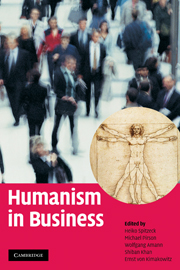Book contents
- Frontmatter
- Contents
- List of figures
- List of tables
- List of editors and contributors
- Acknowledgements
- Humanistic Management Network: paving the way towards a life-serving economy
- Introduction
- Part 1 Philosophic-historical grounding of humanism
- Part 2 Towards an integration of humanism and business on a systems level
- Part 3 Humanistic management
- Part 4 The individual as a change agent for a humane business society
- Index
- References
Introduction
Published online by Cambridge University Press: 25 January 2011
- Frontmatter
- Contents
- List of figures
- List of tables
- List of editors and contributors
- Acknowledgements
- Humanistic Management Network: paving the way towards a life-serving economy
- Introduction
- Part 1 Philosophic-historical grounding of humanism
- Part 2 Towards an integration of humanism and business on a systems level
- Part 3 Humanistic management
- Part 4 The individual as a change agent for a humane business society
- Index
- References
Summary
The king is dead, long live the king?
Before and during the Middle Ages many societies were organized around a dominant power such as a king or priest. Serving the central ruler was the raison d'être of the state, its economy, and its inhabitants, which often resulted in human costs. In the era of enlightenment, proponents of Liberalism broke with this tradition and boldly proclaimed individual freedoms as the central tenet of organized society. Consequently, societies transformed, economies experienced an upsurge, wealth was created at unprecedented rates, and a growing number of citizens were able to pursue their life goals more freely. The industrial revolution that followed is often regarded as a direct result of these societal changes, supporting the argument that Liberalism's empowering effects on the individual were at the epicenter of long-lasting and profound progress in human development.
When analyzing the current state of our societies, one could almost conclude that these advances are being partially reversed in a world in which a new king is worshipped: profit.
This new king's main constituents are shareholder-value-maximizing businesses, and one of his strongest allies is GDP growth, which has generally become a central societal goal – an end rather than a means. In other words, we treat the achievement of GDP growth as an objective in its own right and not as a tool that we can use to achieve an objective.
- Type
- Chapter
- Information
- Humanism in Business , pp. 1 - 12Publisher: Cambridge University PressPrint publication year: 2009
References
- 6
- Cited by



